Critical Thinking Essay: Evaluating Mr. M's Health at University
VerifiedAdded on 2022/08/18
|5
|1147
|16
Essay
AI Summary
This critical thinking essay analyzes the health conditions of Mr. M, a 70-year-old resident of an assisted living facility. The essay details Mr. M's medical history, current medications, and observed clinical manifestations, including low white blood cell count, high lymphocytes, and cloudy urine, suggesting potential infections and cognitive decline. It explores subjective symptoms like memory issues, agitation, and wandering, indicating possible Alzheimer's disease. The essay proposes blood tests, mental status evaluations, and brain imaging for diagnosis. It also discusses the impact of his condition on Mr. M, his family, and the nursing interventions, including memory training and family support. The essay concludes by outlining the specific problems Mr. M faces and their underlying rationale, referencing supporting literature.
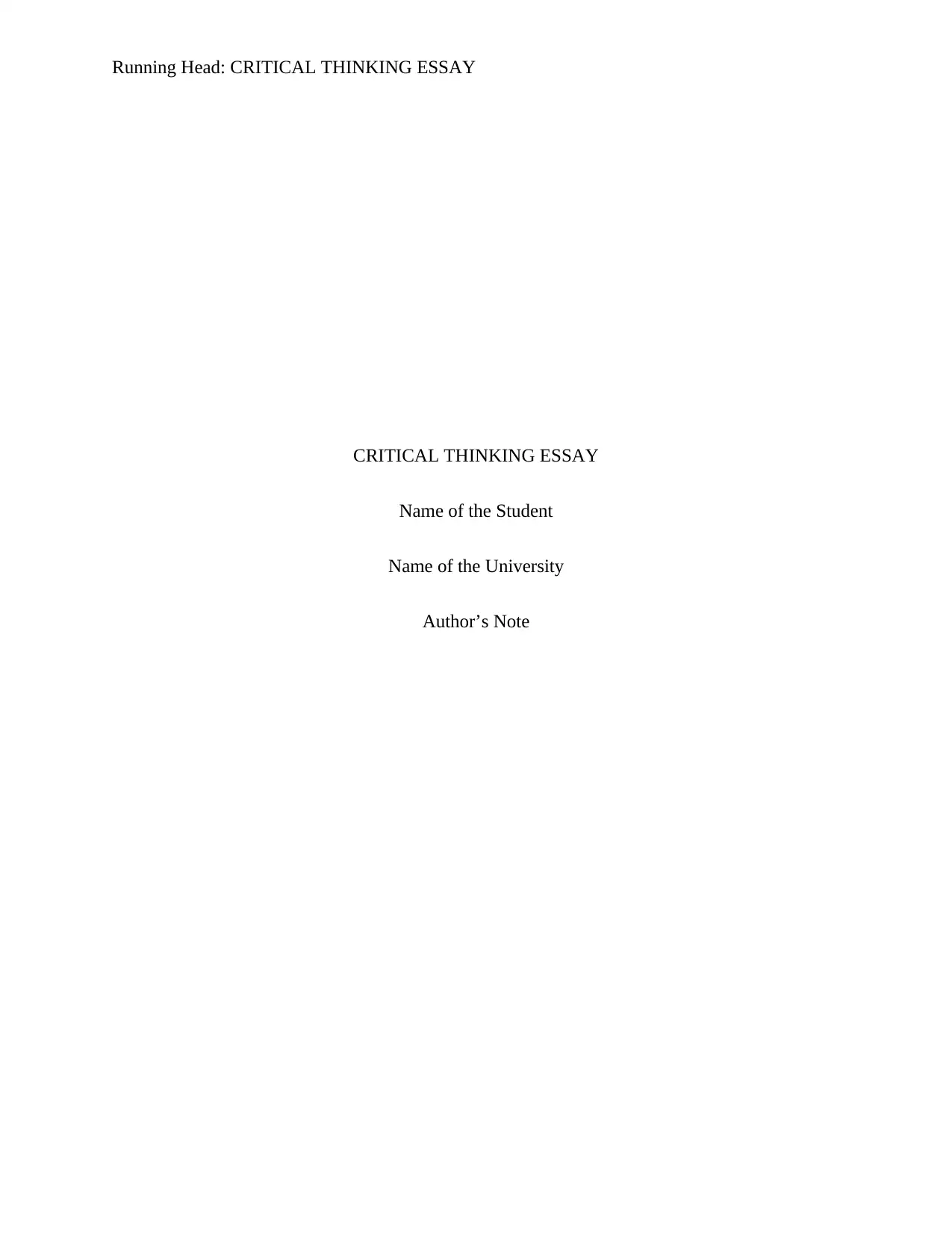
Running Head: CRITICAL THINKING ESSAY
CRITICAL THINKING ESSAY
Name of the Student
Name of the University
Author’s Note
CRITICAL THINKING ESSAY
Name of the Student
Name of the University
Author’s Note
Paraphrase This Document
Need a fresh take? Get an instant paraphrase of this document with our AI Paraphraser
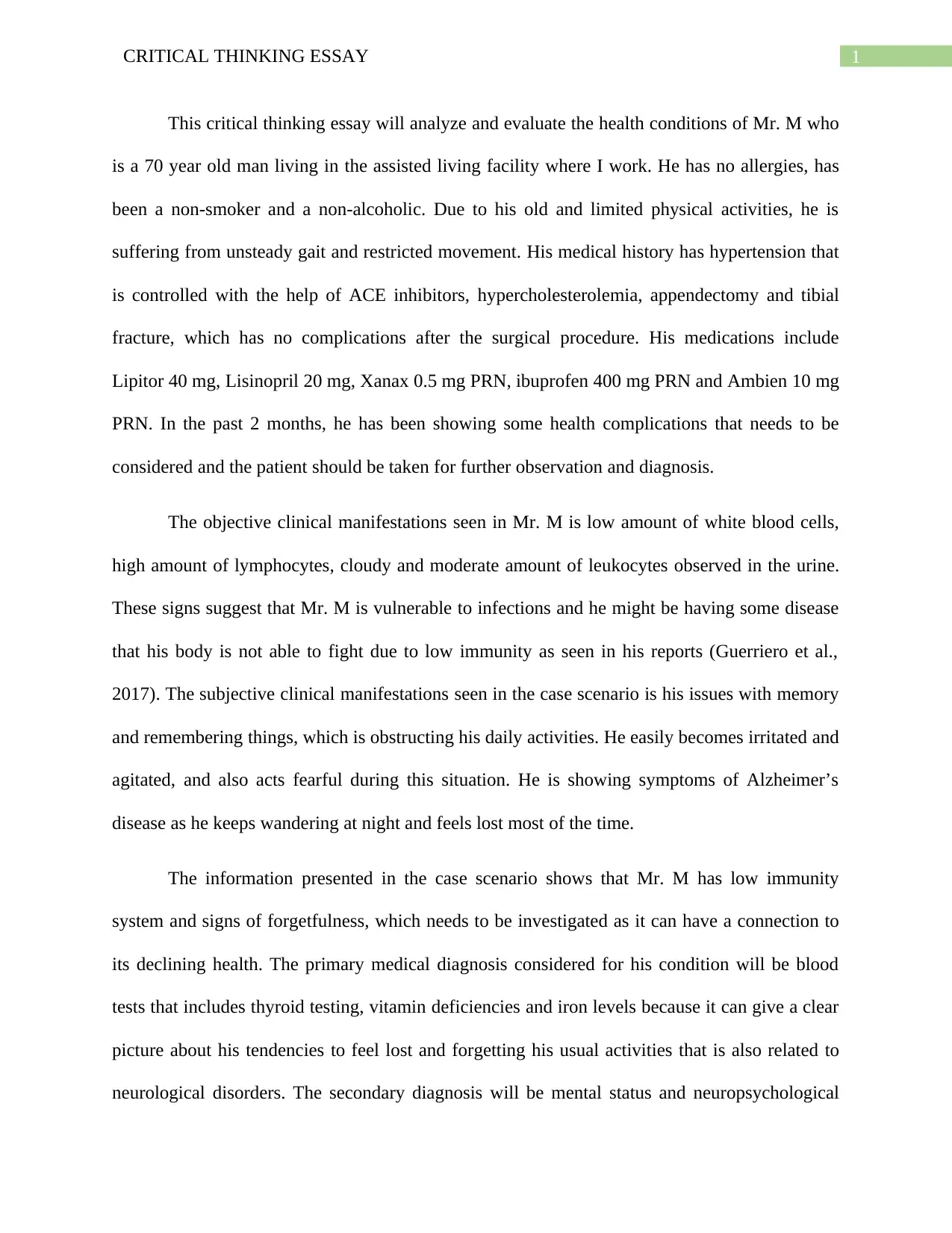
1CRITICAL THINKING ESSAY
This critical thinking essay will analyze and evaluate the health conditions of Mr. M who
is a 70 year old man living in the assisted living facility where I work. He has no allergies, has
been a non-smoker and a non-alcoholic. Due to his old and limited physical activities, he is
suffering from unsteady gait and restricted movement. His medical history has hypertension that
is controlled with the help of ACE inhibitors, hypercholesterolemia, appendectomy and tibial
fracture, which has no complications after the surgical procedure. His medications include
Lipitor 40 mg, Lisinopril 20 mg, Xanax 0.5 mg PRN, ibuprofen 400 mg PRN and Ambien 10 mg
PRN. In the past 2 months, he has been showing some health complications that needs to be
considered and the patient should be taken for further observation and diagnosis.
The objective clinical manifestations seen in Mr. M is low amount of white blood cells,
high amount of lymphocytes, cloudy and moderate amount of leukocytes observed in the urine.
These signs suggest that Mr. M is vulnerable to infections and he might be having some disease
that his body is not able to fight due to low immunity as seen in his reports (Guerriero et al.,
2017). The subjective clinical manifestations seen in the case scenario is his issues with memory
and remembering things, which is obstructing his daily activities. He easily becomes irritated and
agitated, and also acts fearful during this situation. He is showing symptoms of Alzheimer’s
disease as he keeps wandering at night and feels lost most of the time.
The information presented in the case scenario shows that Mr. M has low immunity
system and signs of forgetfulness, which needs to be investigated as it can have a connection to
its declining health. The primary medical diagnosis considered for his condition will be blood
tests that includes thyroid testing, vitamin deficiencies and iron levels because it can give a clear
picture about his tendencies to feel lost and forgetting his usual activities that is also related to
neurological disorders. The secondary diagnosis will be mental status and neuropsychological
This critical thinking essay will analyze and evaluate the health conditions of Mr. M who
is a 70 year old man living in the assisted living facility where I work. He has no allergies, has
been a non-smoker and a non-alcoholic. Due to his old and limited physical activities, he is
suffering from unsteady gait and restricted movement. His medical history has hypertension that
is controlled with the help of ACE inhibitors, hypercholesterolemia, appendectomy and tibial
fracture, which has no complications after the surgical procedure. His medications include
Lipitor 40 mg, Lisinopril 20 mg, Xanax 0.5 mg PRN, ibuprofen 400 mg PRN and Ambien 10 mg
PRN. In the past 2 months, he has been showing some health complications that needs to be
considered and the patient should be taken for further observation and diagnosis.
The objective clinical manifestations seen in Mr. M is low amount of white blood cells,
high amount of lymphocytes, cloudy and moderate amount of leukocytes observed in the urine.
These signs suggest that Mr. M is vulnerable to infections and he might be having some disease
that his body is not able to fight due to low immunity as seen in his reports (Guerriero et al.,
2017). The subjective clinical manifestations seen in the case scenario is his issues with memory
and remembering things, which is obstructing his daily activities. He easily becomes irritated and
agitated, and also acts fearful during this situation. He is showing symptoms of Alzheimer’s
disease as he keeps wandering at night and feels lost most of the time.
The information presented in the case scenario shows that Mr. M has low immunity
system and signs of forgetfulness, which needs to be investigated as it can have a connection to
its declining health. The primary medical diagnosis considered for his condition will be blood
tests that includes thyroid testing, vitamin deficiencies and iron levels because it can give a clear
picture about his tendencies to feel lost and forgetting his usual activities that is also related to
neurological disorders. The secondary diagnosis will be mental status and neuropsychological
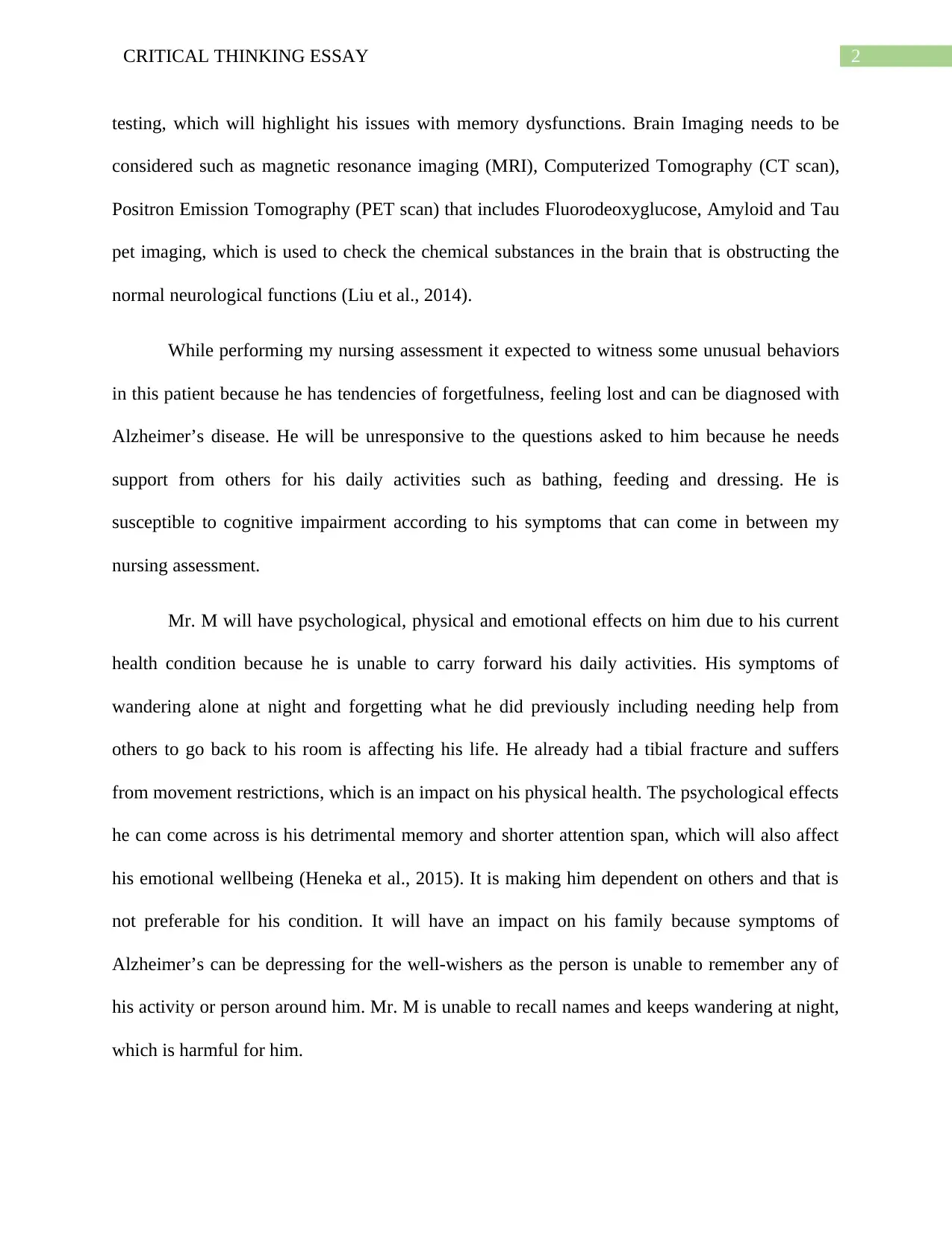
2CRITICAL THINKING ESSAY
testing, which will highlight his issues with memory dysfunctions. Brain Imaging needs to be
considered such as magnetic resonance imaging (MRI), Computerized Tomography (CT scan),
Positron Emission Tomography (PET scan) that includes Fluorodeoxyglucose, Amyloid and Tau
pet imaging, which is used to check the chemical substances in the brain that is obstructing the
normal neurological functions (Liu et al., 2014).
While performing my nursing assessment it expected to witness some unusual behaviors
in this patient because he has tendencies of forgetfulness, feeling lost and can be diagnosed with
Alzheimer’s disease. He will be unresponsive to the questions asked to him because he needs
support from others for his daily activities such as bathing, feeding and dressing. He is
susceptible to cognitive impairment according to his symptoms that can come in between my
nursing assessment.
Mr. M will have psychological, physical and emotional effects on him due to his current
health condition because he is unable to carry forward his daily activities. His symptoms of
wandering alone at night and forgetting what he did previously including needing help from
others to go back to his room is affecting his life. He already had a tibial fracture and suffers
from movement restrictions, which is an impact on his physical health. The psychological effects
he can come across is his detrimental memory and shorter attention span, which will also affect
his emotional wellbeing (Heneka et al., 2015). It is making him dependent on others and that is
not preferable for his condition. It will have an impact on his family because symptoms of
Alzheimer’s can be depressing for the well-wishers as the person is unable to remember any of
his activity or person around him. Mr. M is unable to recall names and keeps wandering at night,
which is harmful for him.
testing, which will highlight his issues with memory dysfunctions. Brain Imaging needs to be
considered such as magnetic resonance imaging (MRI), Computerized Tomography (CT scan),
Positron Emission Tomography (PET scan) that includes Fluorodeoxyglucose, Amyloid and Tau
pet imaging, which is used to check the chemical substances in the brain that is obstructing the
normal neurological functions (Liu et al., 2014).
While performing my nursing assessment it expected to witness some unusual behaviors
in this patient because he has tendencies of forgetfulness, feeling lost and can be diagnosed with
Alzheimer’s disease. He will be unresponsive to the questions asked to him because he needs
support from others for his daily activities such as bathing, feeding and dressing. He is
susceptible to cognitive impairment according to his symptoms that can come in between my
nursing assessment.
Mr. M will have psychological, physical and emotional effects on him due to his current
health condition because he is unable to carry forward his daily activities. His symptoms of
wandering alone at night and forgetting what he did previously including needing help from
others to go back to his room is affecting his life. He already had a tibial fracture and suffers
from movement restrictions, which is an impact on his physical health. The psychological effects
he can come across is his detrimental memory and shorter attention span, which will also affect
his emotional wellbeing (Heneka et al., 2015). It is making him dependent on others and that is
not preferable for his condition. It will have an impact on his family because symptoms of
Alzheimer’s can be depressing for the well-wishers as the person is unable to remember any of
his activity or person around him. Mr. M is unable to recall names and keeps wandering at night,
which is harmful for him.
⊘ This is a preview!⊘
Do you want full access?
Subscribe today to unlock all pages.

Trusted by 1+ million students worldwide
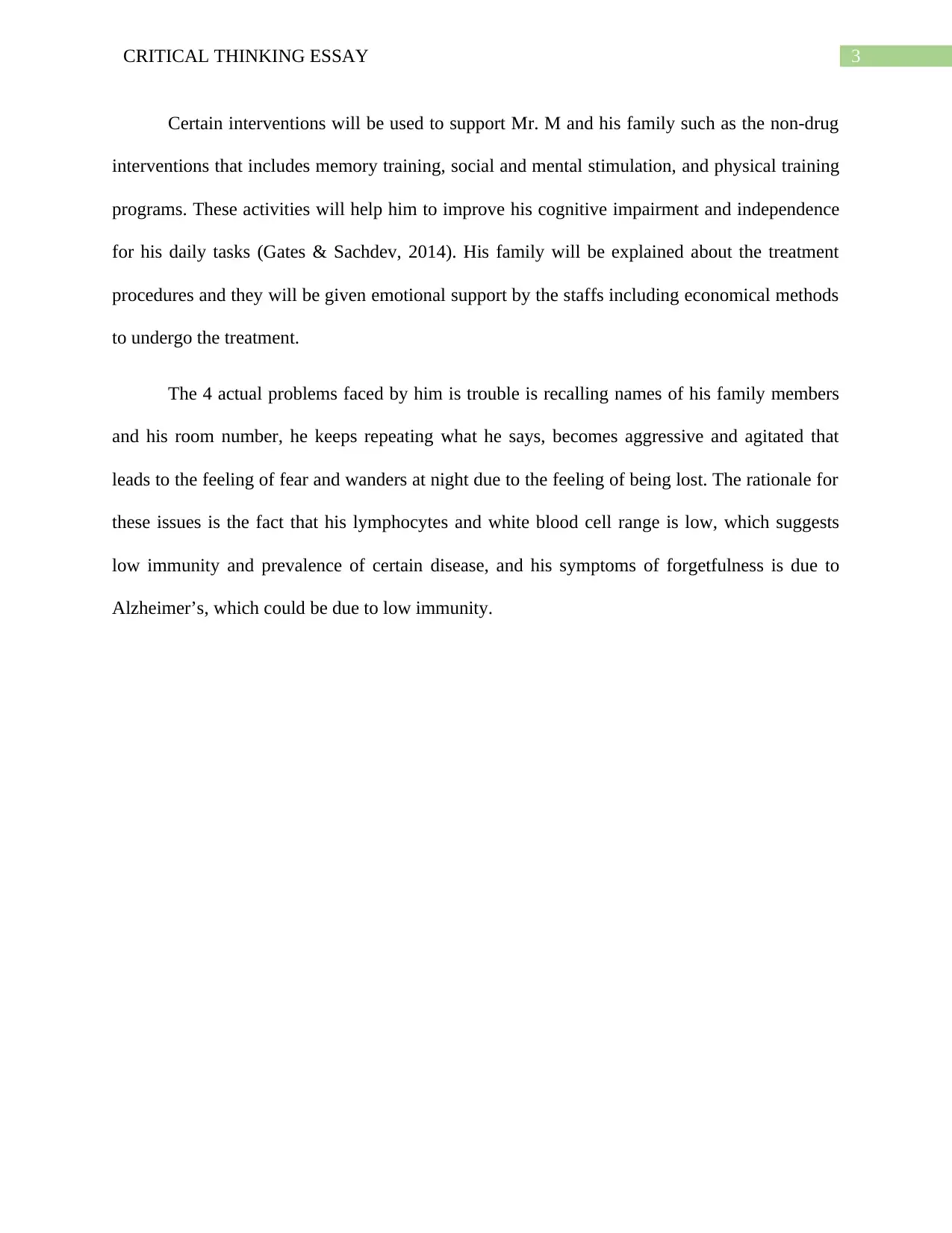
3CRITICAL THINKING ESSAY
Certain interventions will be used to support Mr. M and his family such as the non-drug
interventions that includes memory training, social and mental stimulation, and physical training
programs. These activities will help him to improve his cognitive impairment and independence
for his daily tasks (Gates & Sachdev, 2014). His family will be explained about the treatment
procedures and they will be given emotional support by the staffs including economical methods
to undergo the treatment.
The 4 actual problems faced by him is trouble is recalling names of his family members
and his room number, he keeps repeating what he says, becomes aggressive and agitated that
leads to the feeling of fear and wanders at night due to the feeling of being lost. The rationale for
these issues is the fact that his lymphocytes and white blood cell range is low, which suggests
low immunity and prevalence of certain disease, and his symptoms of forgetfulness is due to
Alzheimer’s, which could be due to low immunity.
Certain interventions will be used to support Mr. M and his family such as the non-drug
interventions that includes memory training, social and mental stimulation, and physical training
programs. These activities will help him to improve his cognitive impairment and independence
for his daily tasks (Gates & Sachdev, 2014). His family will be explained about the treatment
procedures and they will be given emotional support by the staffs including economical methods
to undergo the treatment.
The 4 actual problems faced by him is trouble is recalling names of his family members
and his room number, he keeps repeating what he says, becomes aggressive and agitated that
leads to the feeling of fear and wanders at night due to the feeling of being lost. The rationale for
these issues is the fact that his lymphocytes and white blood cell range is low, which suggests
low immunity and prevalence of certain disease, and his symptoms of forgetfulness is due to
Alzheimer’s, which could be due to low immunity.
Paraphrase This Document
Need a fresh take? Get an instant paraphrase of this document with our AI Paraphraser
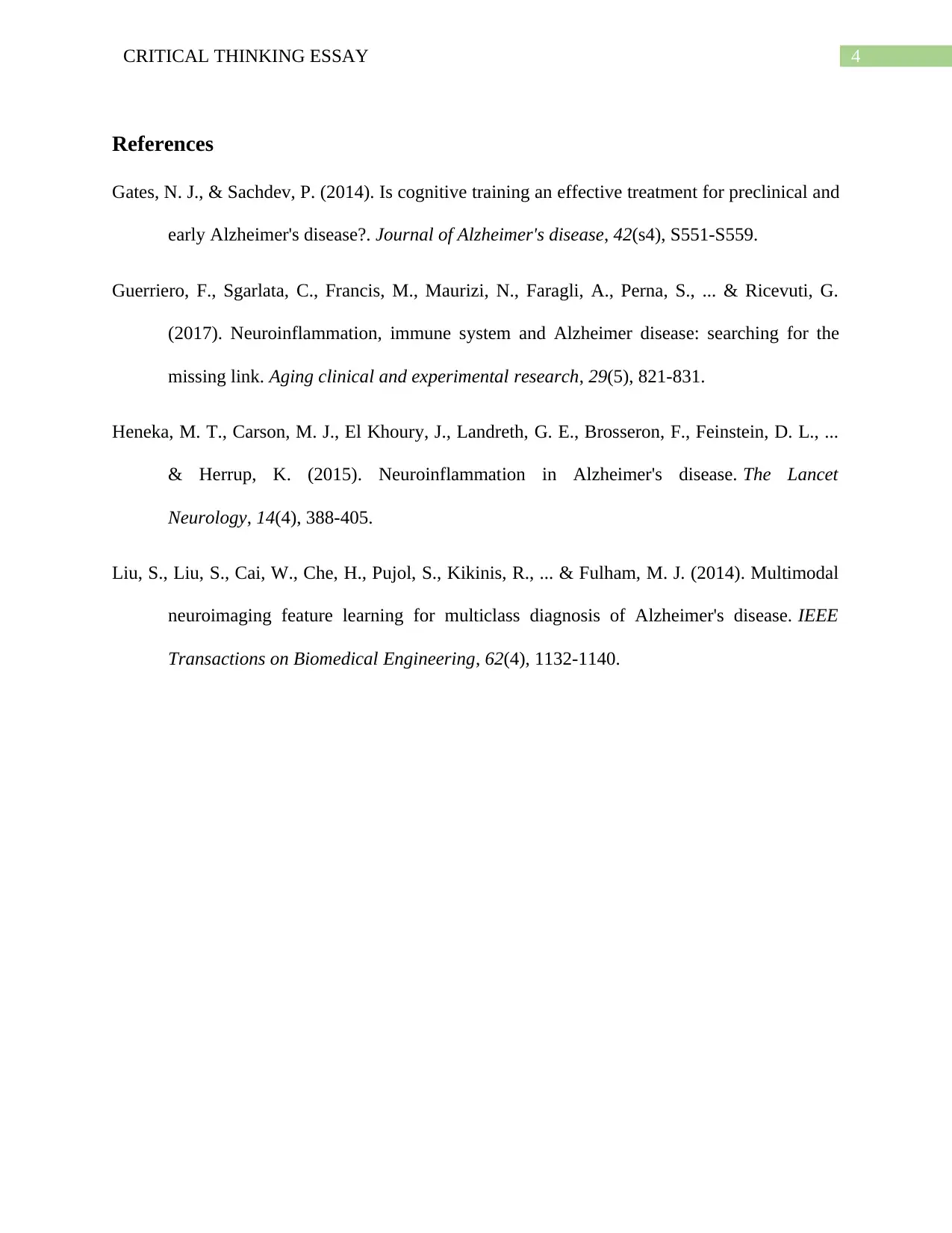
4CRITICAL THINKING ESSAY
References
Gates, N. J., & Sachdev, P. (2014). Is cognitive training an effective treatment for preclinical and
early Alzheimer's disease?. Journal of Alzheimer's disease, 42(s4), S551-S559.
Guerriero, F., Sgarlata, C., Francis, M., Maurizi, N., Faragli, A., Perna, S., ... & Ricevuti, G.
(2017). Neuroinflammation, immune system and Alzheimer disease: searching for the
missing link. Aging clinical and experimental research, 29(5), 821-831.
Heneka, M. T., Carson, M. J., El Khoury, J., Landreth, G. E., Brosseron, F., Feinstein, D. L., ...
& Herrup, K. (2015). Neuroinflammation in Alzheimer's disease. The Lancet
Neurology, 14(4), 388-405.
Liu, S., Liu, S., Cai, W., Che, H., Pujol, S., Kikinis, R., ... & Fulham, M. J. (2014). Multimodal
neuroimaging feature learning for multiclass diagnosis of Alzheimer's disease. IEEE
Transactions on Biomedical Engineering, 62(4), 1132-1140.
References
Gates, N. J., & Sachdev, P. (2014). Is cognitive training an effective treatment for preclinical and
early Alzheimer's disease?. Journal of Alzheimer's disease, 42(s4), S551-S559.
Guerriero, F., Sgarlata, C., Francis, M., Maurizi, N., Faragli, A., Perna, S., ... & Ricevuti, G.
(2017). Neuroinflammation, immune system and Alzheimer disease: searching for the
missing link. Aging clinical and experimental research, 29(5), 821-831.
Heneka, M. T., Carson, M. J., El Khoury, J., Landreth, G. E., Brosseron, F., Feinstein, D. L., ...
& Herrup, K. (2015). Neuroinflammation in Alzheimer's disease. The Lancet
Neurology, 14(4), 388-405.
Liu, S., Liu, S., Cai, W., Che, H., Pujol, S., Kikinis, R., ... & Fulham, M. J. (2014). Multimodal
neuroimaging feature learning for multiclass diagnosis of Alzheimer's disease. IEEE
Transactions on Biomedical Engineering, 62(4), 1132-1140.
1 out of 5
Your All-in-One AI-Powered Toolkit for Academic Success.
+13062052269
info@desklib.com
Available 24*7 on WhatsApp / Email
![[object Object]](/_next/static/media/star-bottom.7253800d.svg)
Unlock your academic potential
Copyright © 2020–2026 A2Z Services. All Rights Reserved. Developed and managed by ZUCOL.

